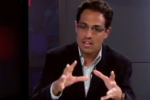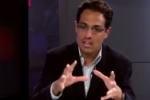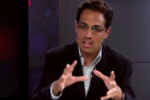Just to add some 'score' to your thread!!
)I don't have the url so am constrained to post the entire article,,,enjoy reading it for your 'enlightenment'!!
Chronicle of Higher Education, April 1, 2014
Do Human Evolution and Islam Conflict in the Classroom?
By Sadia Khatri

This is an article from Al Fanar Media, an online publication that covers higher education in the Arab world. It is presented here under an agreement with The Chronicle.
\Rabat, Morocco—Hanging outside of Professor Touria Benazzour’s office is a cut out of a magazine portrait of Charles Darwin.
Benazzour put it up when she began teaching human evolution 25 years ago, one of the first professors to introduce the sensitive and controversial topic in a Moroccan classroom. Today, Benazzour teaches in the Master’s degree program at Mohammad V University, the capital’s oldest higher-education public institution. She claims her semester-long course on evolution is still the only one of its kind at a public university.
Reflecting on her students, Benazzour said, “They do want to know more, but whether they believe in it or not, I really don’t know.”
In terms of even hearing about evolution, Benazzour’s students are the exception. Most Moroccans today complete high school and college without coming across the name “Darwin” or the term “natural selection.” The avoidance of evolution, underscores a tension between Islam and science in one of the most liberal Muslim countries.
Science books in Morocco generally begin with invocations to Allah, or God, and say little about evolutionary biology’s breakthrough with Darwin’s publication of “The Origin of Species.” Attempts to avoid the topic are evident in Moroccan syllabi: A handful of textbooks and lectures refer to natural selection, but only in the context of plants and other animals.
Acceptance of evolution among Western scientists, on the other hand, is essentially universal. Evolutionary science drives genetics, which is the centerpiece of many of the latest developments in medicine—including the ability to tailor treatments to individuals.
In Morocco, for a nation insistent upon painting a moderate picture of Islam to the West, a trait King Mohammad VI is especially credited for, its institutional practices don’t match up.
“In most cases it is up to the professors,” said Dr. Mohamad Melouk, professor of education at the Faculty of Education in Irfane, Rabat. Students who learn about evolution during school years, then, tend to do so indirectly: Through the web, popular TV shows and documentaries, or friends.
Loubna Ryani, for example, recalls how her high-school science teacher brought in supplementary material to the class about human evolution. But Ryani, 22, went to a private high school, whose curriculum differs from its public-school counterparts. “He [the professor] talked about a lot of other things not included in the syllabus,” Ryani added. Similarly, students who go to private French high schools like Lycée Descartes in Rabat, have a different level of exposure. Human evolution, not taboo there, is commonly taught.
But for the average public institution, Benazzour attributes the absence of “controversial” ideas to the new Islamic government. According to her, the Moroccan education system originally included some mention of Darwinism, when remnants of French and Spanish influence still prevailed. But in recent years, the king’s Higher Council of Religious Scholars (CSO) has exerted greater control over educational norms, and the original references to Darwin have been removed.
Interestingly, these actions appear out of step with the beliefs of many in the country. In 2013, a Pew Research Center study of Muslim nations found Morocco to be one of the more liberal, where 63 percent of Moroccans believe humans and other living things have evolved over time. This implies little correlation between what people believe and what is taught in the classroom.Other Arab countries are often similarly conflicted. An Egyptian professor familiar with science education said the teaching of Darwinian evolution is forbidden in Yemen, Oman, and Iraq. In Palestine, Egypt, the United Arab Emirates, and Lebanon, where textbooks are often from or influenced by the United Kingdom or Europe, the subject tends to be taught in university-level biology classes only. Even then it is often treated as theory, not fact.
In 2009, Nidhal Guessoum, a professor of physics and astronomy at the American University of Sharjah, in the UAE, conducted a poll at the university which found that 62 percent of Muslim professors and students believed evolution to be an “unproven theory.” Only 10 percent of non-Muslim professors and students felt the same way.
Morocco, of course, has long been a country of contrasts. Cities boast century-old medinas, but moving further, the landscape switches to modern villas, sprawling parks and air-conditioned tramways. Over a third of the country’s multilingual populace speaks French, and each year, more than a million tourists flood the country’s beach-towns and bustling markets.
Remnants of the decades of French and Spanish colonization, before the Islamic monarchy took over in 1956, are evident everywhere. Today, Morocco’s 32 million people form a melting pot of European, Araband African influences, possibly making it easier for Westerners to identify with it than with some other Muslim nations. The name Morocco itself is apt: its Arabic equivalent, “Maghreb” means “the West.”
Lachen Sguenfle, president of the local Islamic council in Temara, a small town near Rabat, details the common explanation of why some Muslims reject human evolution: the Quran explicitly states humans came from mud and water. In sum, the theory of evolution must be false.
“At any given time a theory can become something everyone talks about, but then another theory comes along and the old one dies. This is how science goes,” said Sguenfle, pointing out the belief among some Muslims that unlike books written by humans, the Quran is a perfect volume that will remain forever unchanged.
But while Sguenfle believes that evolution and Islam are incompatible, some students and professors are actively seeking reconciliation between the two. These Darwin supporters are quick to argue how evolution is not only accepted by Islam, but is in fact validated by it.
“People should try to read the Quran to understand evolution,” said Yasmine Chouihat, a 19-year-old a biology student at Mohammad V University. She repeated Sguenfle’s point: the Quran and evolution both say life came from water, but for her, this simply bolsters the Quran’s authority, since it is in agreement with evolutionary principles.
Laila Sbabou, a 36-year-old professor of molecular biology and bioinformatics at Mohammad V, says that belief or disbelief in human evolution has no bearing on her work.
She was first introduced to human evolution in one of Benazzour’s classes as an undergraduate. While she hesitates to accept it still—“When you start talking about chimps and monkeys, I’m not so sure”—Sbabou does not oppose teaching human evolution in classes, as long as it is presented as a concept that could change later as scientists learn more.
Most Muslims have no problem with microbial and even animal evolution, according to Salman Hameed, an astronomy professor at Hampshire College, in the United States, and director of The Center for the Study of Science in Muslim Societies.
“Human evolution, the idea that humans share a common lineage with other animals, has more resistance amongst Muslims,” he said.
Hameed, who has been conducting interdisciplinary research on Muslims’ attitudes towards modern science, and towards creationism and Darwinism, believes individuals can seek inspiration to learn about the universe from the Quran.
“The whole science and religion issue is related to the questions of origins,” he said. “Religious answers are about meaning and the ultimate cause of things. Scientific answers are about immediate evidence and do not address issues of meaning.” For him, the approaches do not have to contradict.
)I don't have the url so am constrained to post the entire article,,,enjoy reading it for your 'enlightenment'!!
Chronicle of Higher Education, April 1, 2014
Do Human Evolution and Islam Conflict in the Classroom?
By Sadia Khatri

This is an article from Al Fanar Media, an online publication that covers higher education in the Arab world. It is presented here under an agreement with The Chronicle.
\Rabat, Morocco—Hanging outside of Professor Touria Benazzour’s office is a cut out of a magazine portrait of Charles Darwin.
Benazzour put it up when she began teaching human evolution 25 years ago, one of the first professors to introduce the sensitive and controversial topic in a Moroccan classroom. Today, Benazzour teaches in the Master’s degree program at Mohammad V University, the capital’s oldest higher-education public institution. She claims her semester-long course on evolution is still the only one of its kind at a public university.
Reflecting on her students, Benazzour said, “They do want to know more, but whether they believe in it or not, I really don’t know.”
In terms of even hearing about evolution, Benazzour’s students are the exception. Most Moroccans today complete high school and college without coming across the name “Darwin” or the term “natural selection.” The avoidance of evolution, underscores a tension between Islam and science in one of the most liberal Muslim countries.
Science books in Morocco generally begin with invocations to Allah, or God, and say little about evolutionary biology’s breakthrough with Darwin’s publication of “The Origin of Species.” Attempts to avoid the topic are evident in Moroccan syllabi: A handful of textbooks and lectures refer to natural selection, but only in the context of plants and other animals.
Acceptance of evolution among Western scientists, on the other hand, is essentially universal. Evolutionary science drives genetics, which is the centerpiece of many of the latest developments in medicine—including the ability to tailor treatments to individuals.
In Morocco, for a nation insistent upon painting a moderate picture of Islam to the West, a trait King Mohammad VI is especially credited for, its institutional practices don’t match up.
“In most cases it is up to the professors,” said Dr. Mohamad Melouk, professor of education at the Faculty of Education in Irfane, Rabat. Students who learn about evolution during school years, then, tend to do so indirectly: Through the web, popular TV shows and documentaries, or friends.
Loubna Ryani, for example, recalls how her high-school science teacher brought in supplementary material to the class about human evolution. But Ryani, 22, went to a private high school, whose curriculum differs from its public-school counterparts. “He [the professor] talked about a lot of other things not included in the syllabus,” Ryani added. Similarly, students who go to private French high schools like Lycée Descartes in Rabat, have a different level of exposure. Human evolution, not taboo there, is commonly taught.
But for the average public institution, Benazzour attributes the absence of “controversial” ideas to the new Islamic government. According to her, the Moroccan education system originally included some mention of Darwinism, when remnants of French and Spanish influence still prevailed. But in recent years, the king’s Higher Council of Religious Scholars (CSO) has exerted greater control over educational norms, and the original references to Darwin have been removed.
Interestingly, these actions appear out of step with the beliefs of many in the country. In 2013, a Pew Research Center study of Muslim nations found Morocco to be one of the more liberal, where 63 percent of Moroccans believe humans and other living things have evolved over time. This implies little correlation between what people believe and what is taught in the classroom.Other Arab countries are often similarly conflicted. An Egyptian professor familiar with science education said the teaching of Darwinian evolution is forbidden in Yemen, Oman, and Iraq. In Palestine, Egypt, the United Arab Emirates, and Lebanon, where textbooks are often from or influenced by the United Kingdom or Europe, the subject tends to be taught in university-level biology classes only. Even then it is often treated as theory, not fact.
In 2009, Nidhal Guessoum, a professor of physics and astronomy at the American University of Sharjah, in the UAE, conducted a poll at the university which found that 62 percent of Muslim professors and students believed evolution to be an “unproven theory.” Only 10 percent of non-Muslim professors and students felt the same way.
Morocco, of course, has long been a country of contrasts. Cities boast century-old medinas, but moving further, the landscape switches to modern villas, sprawling parks and air-conditioned tramways. Over a third of the country’s multilingual populace speaks French, and each year, more than a million tourists flood the country’s beach-towns and bustling markets.
Remnants of the decades of French and Spanish colonization, before the Islamic monarchy took over in 1956, are evident everywhere. Today, Morocco’s 32 million people form a melting pot of European, Araband African influences, possibly making it easier for Westerners to identify with it than with some other Muslim nations. The name Morocco itself is apt: its Arabic equivalent, “Maghreb” means “the West.”
Lachen Sguenfle, president of the local Islamic council in Temara, a small town near Rabat, details the common explanation of why some Muslims reject human evolution: the Quran explicitly states humans came from mud and water. In sum, the theory of evolution must be false.
“At any given time a theory can become something everyone talks about, but then another theory comes along and the old one dies. This is how science goes,” said Sguenfle, pointing out the belief among some Muslims that unlike books written by humans, the Quran is a perfect volume that will remain forever unchanged.
But while Sguenfle believes that evolution and Islam are incompatible, some students and professors are actively seeking reconciliation between the two. These Darwin supporters are quick to argue how evolution is not only accepted by Islam, but is in fact validated by it.
“People should try to read the Quran to understand evolution,” said Yasmine Chouihat, a 19-year-old a biology student at Mohammad V University. She repeated Sguenfle’s point: the Quran and evolution both say life came from water, but for her, this simply bolsters the Quran’s authority, since it is in agreement with evolutionary principles.
Laila Sbabou, a 36-year-old professor of molecular biology and bioinformatics at Mohammad V, says that belief or disbelief in human evolution has no bearing on her work.
She was first introduced to human evolution in one of Benazzour’s classes as an undergraduate. While she hesitates to accept it still—“When you start talking about chimps and monkeys, I’m not so sure”—Sbabou does not oppose teaching human evolution in classes, as long as it is presented as a concept that could change later as scientists learn more.
Most Muslims have no problem with microbial and even animal evolution, according to Salman Hameed, an astronomy professor at Hampshire College, in the United States, and director of The Center for the Study of Science in Muslim Societies.
“Human evolution, the idea that humans share a common lineage with other animals, has more resistance amongst Muslims,” he said.
Hameed, who has been conducting interdisciplinary research on Muslims’ attitudes towards modern science, and towards creationism and Darwinism, believes individuals can seek inspiration to learn about the universe from the Quran.
“The whole science and religion issue is related to the questions of origins,” he said. “Religious answers are about meaning and the ultimate cause of things. Scientific answers are about immediate evidence and do not address issues of meaning.” For him, the approaches do not have to contradict.






